Ownership Experience
2005 Volkswagen Passat Saloon
An insight into why purchasing a 15 year old car might not always be a great idea.
Even when everyone say's they're the best cars ever made.
Header Picture - B5.5 Passat Parked outside a local forest entrance
Written: 23rd December 2019
Overview
It’s been just over 18 months now since I purchased my 2005 Volkswagen Passat (B5.5) for a grand total of £1,500. It really is a lovely car to drive, although it is now approaching 15 years old and is perfectly equipped with the renowned PD130 1.9TDI Diesel engine, matched with a smooth 5-speed gearbox and full leather interior. At the time of purchase, the car had only three owners and 122,250 miles on the odometer, which really is nothing to these engines and 10 months MOT.
Since then, I’ve put on 28,000 miles on the car and thanks to placement, practically have been to everywhere in Northern Ireland in the car. I’ve taken it off-road, learned to tow trailers in the car, fitted it with roof racks and even slept numerous times in the car. There has only ever been one time where its left me stranded, but we will come to that.
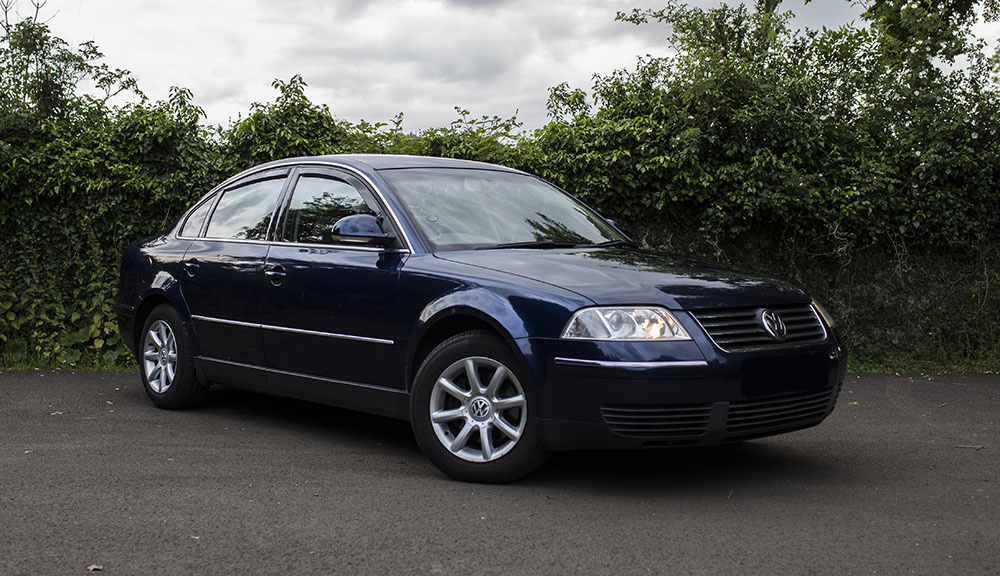
VW Passat B5.5, freshly detailed for this picture
Truly, it has been an amazing first car to own and has been able to do anything I’ve thrown at it so far. I hope that it continues to give me reliable service over the coming years until it’s time to finally replace it with something both more economical, environmentally friendly and bigger.
Ask anyone who has a small inclination on cars what their opinion is of Volkswagen 1.9TDI PD Diesel Engines from 2001-04 and they’ll all go on about how they are the most bullet proof cars about, will service you for half a million miles and never skip a beat. To be honest, they are probably true – the configuration of these engines is perfectly matched to the transmissions fitted to the cars. They are easy to maintain and give good economy, with the PD130 in the above Passat easily giving me an average combined consumption of 46.4 UK MPG, over the 28,000 miles driven.
But its always just about the engines.
| Mileage at Purchase | 122,249 miles |
|---|---|
| Current Mileage [05/07/2020] | 153,850 miles |
| Engine Spec | 1.9TDI 130 BHP 5 Speed Manual |
| Diesel Consumed | 3,090.01 litres |
| CO2 Emitted Since Ownership | 8,281.19 kg |
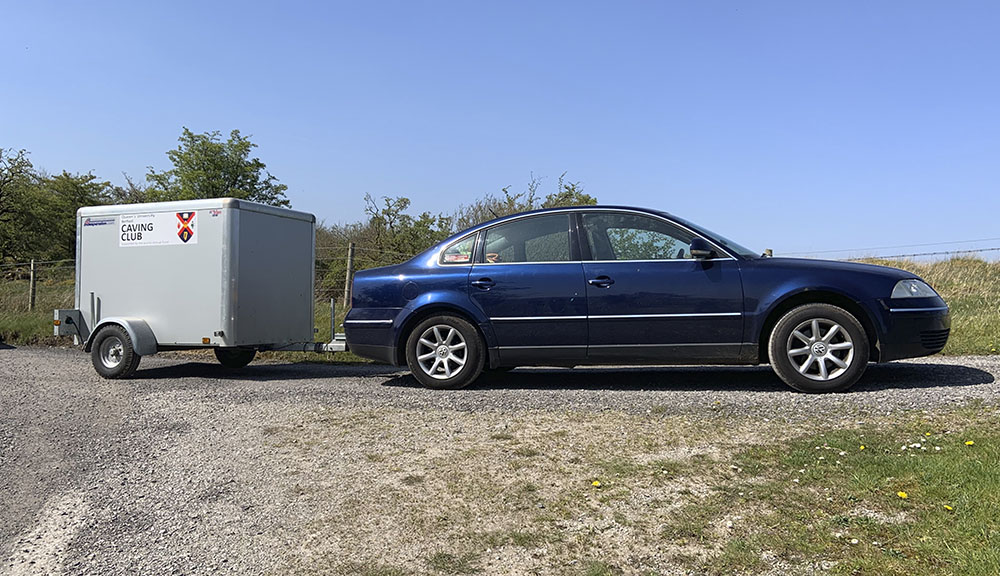
Getting some towing experience (750kg trailer)
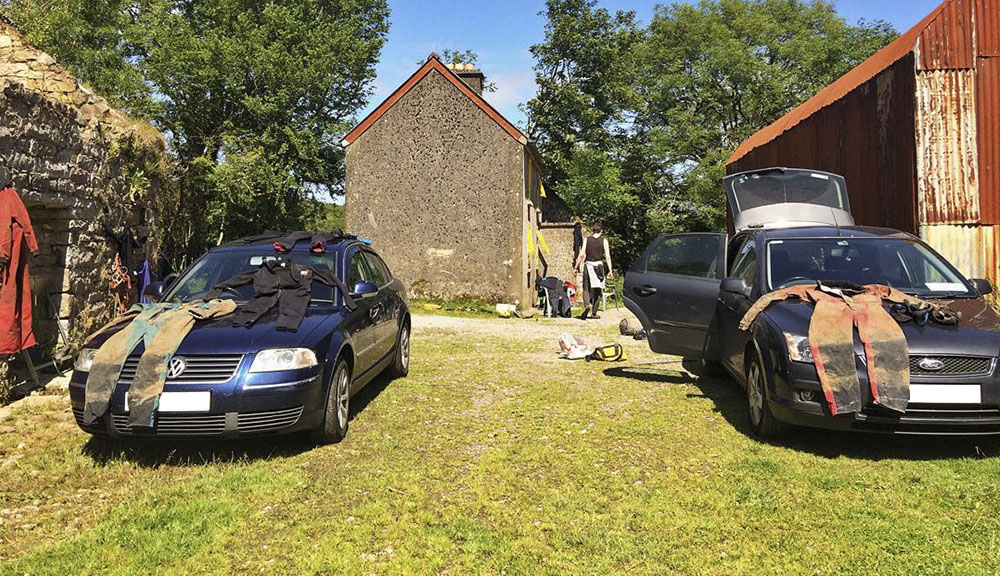
A handy drying rack for muddy gear (sorry paint!)
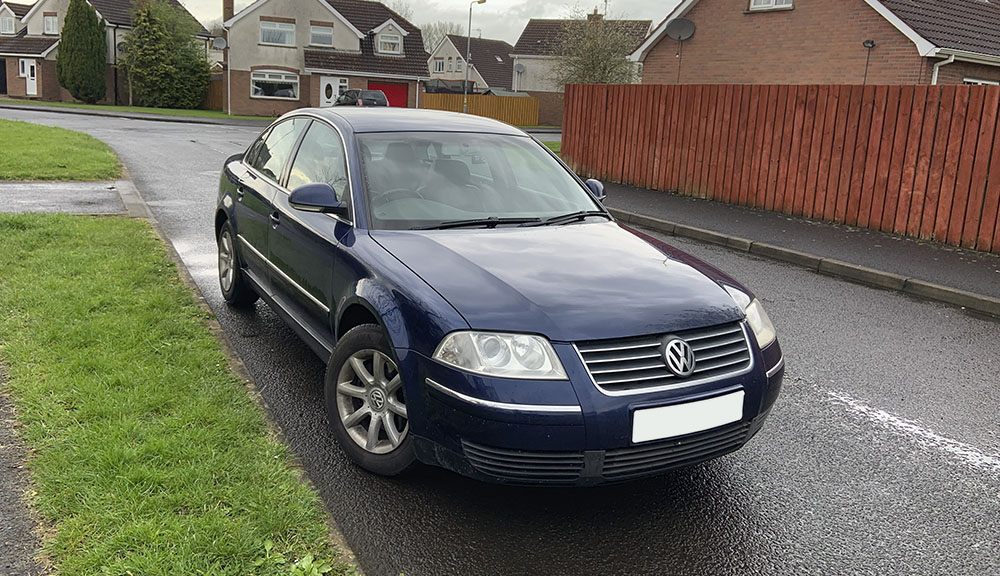
Post Hand-Wash
"It didn't seem like anything was broken"
- The Biggest Understatement Ever at purchase
"Common Problems" - An Epidemic
After 18 months, the amount of ‘Common Problems’ I’ve had with this car, it really makes you start to wonder how a car can have so many known problems, yet still get praises.
I’ll be honest, in hindsight, this car I bought probably was never repaired properly by its previous owners, with them just skipping over these issues as they were noticed because they couldn’t be bothered with getting them sorted, but unfortunately for me, every single one of them I’ve had to get fixed because of just how much time I spend in my car.
So lets get into them:
Alternator Failures (Tensioner/Pulley/Alternator)
This one is renowned to happen as some point in the ownership experience and for myself was only 3 days into ownership. Basically, your alternator will fail and this will be either tensioner and/or pulley on the alternator, or in my case the whole alternator fails. Repair wise, it’s not the worse but can get costly depending on what fails. Visit a local scrapyard to check for parts before buying new.
Pollen Filter Housing Gasket – Water Leaks!
This is the most common issue and the worst. To summarise, on the passenger side of the vehicle is located the pollen filter where fresh air is taken into the car for use with the Air Conditioning system, you’ll have to remove the cowl under the bonnet to get access to this. It compromised of two sections, an upper and lower piece which is sealed by use of a gasket. This gasket fails over time and in conjunction with the clogging up of the drain holes around the battery can cause water to quickly seep into the cabin through this failed gasket and in turn, absolutely ruin your day.
I’ve had to have this one repaired around twice now, exactly 12 months apart and the easiest method to repair is use of RTV Gasket Sealer. The longest part of this repair is drying the carpets out properly to remove any mildew smell and then repairing all the damage caused by the water sitting in the passenger side footwell – did I mention it’s in this footwell that Volkswagen decided to put all of the cars electronics? Yep, they did that.
So, lament on the inevitable, soggy carpets, foggy windows and all things damp!
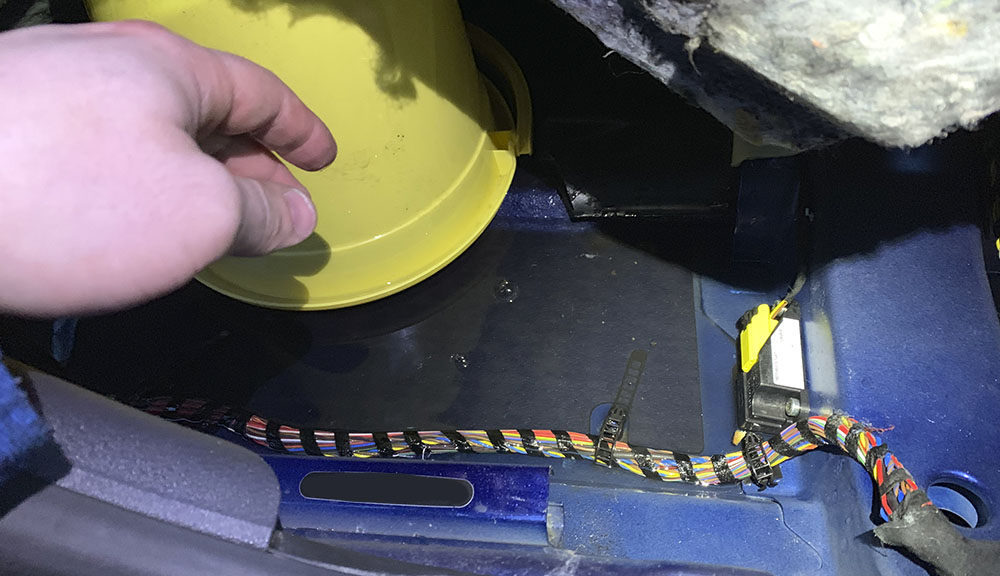
Footwell with large puddle of water and wet carpets
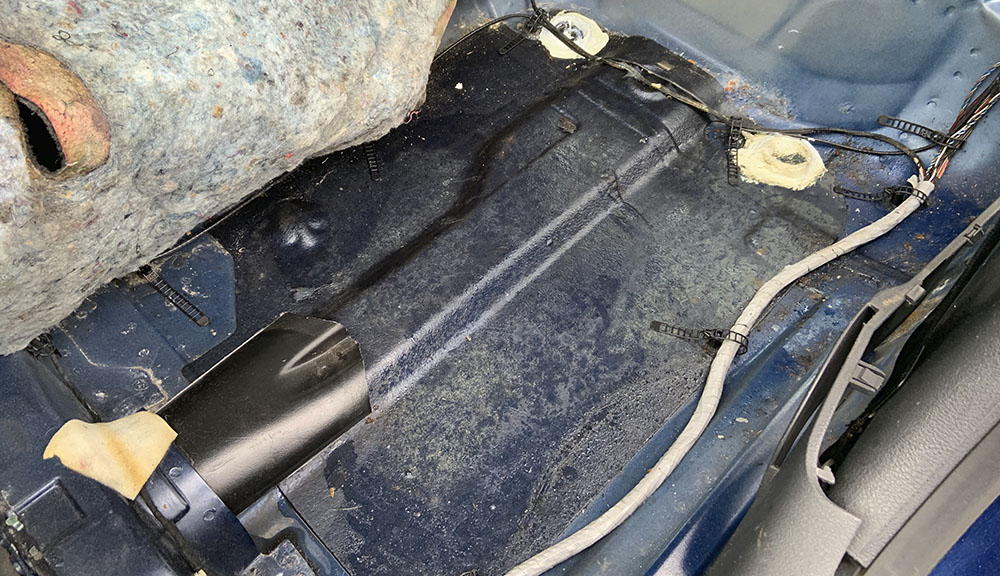
Backseat Passengers Side Footwell - Water Stains
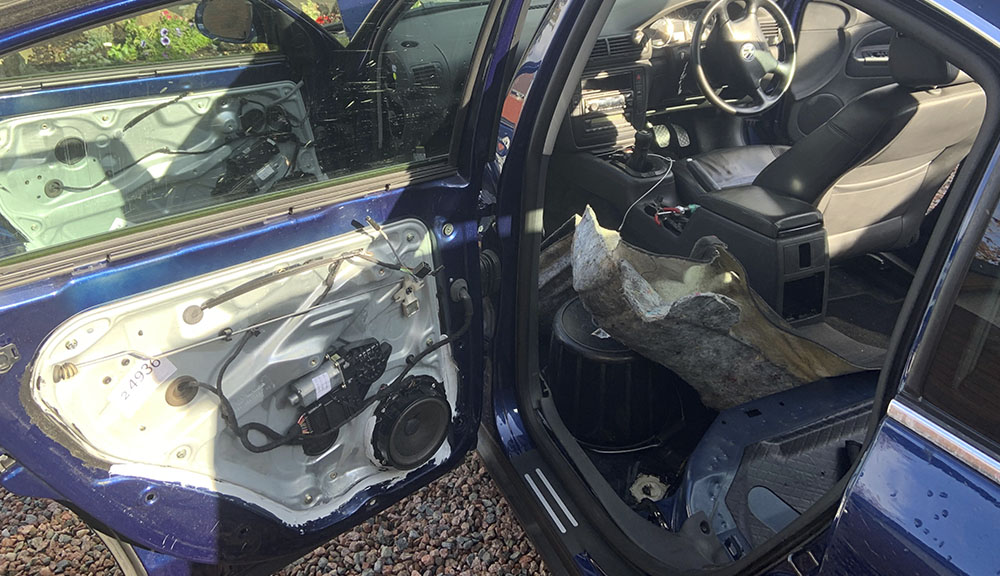
Full Interior ripped out of car for leak repairs
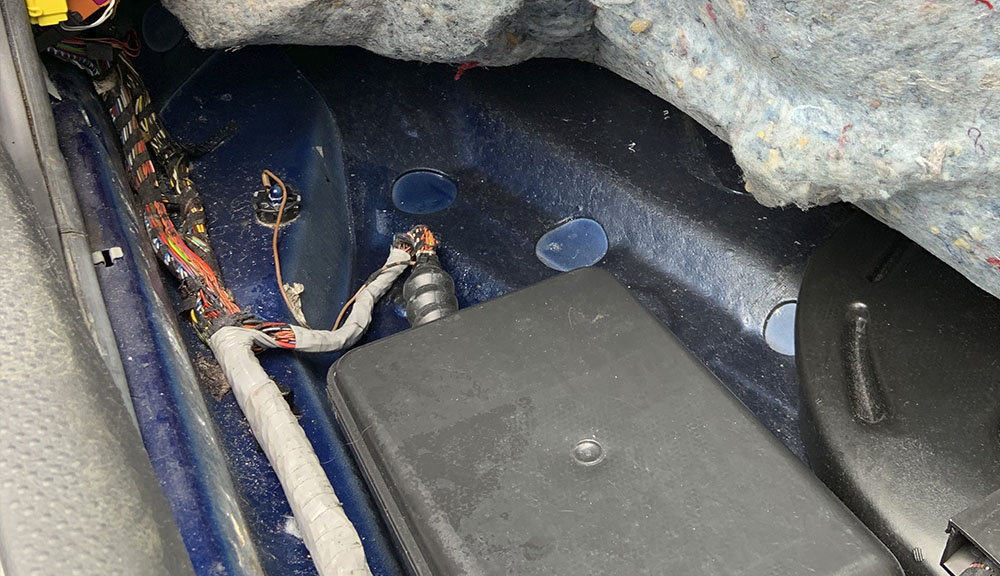
Passengers footwell featuring water damaged loom!
Door Seals – More Water Leaks!
You thought that was the only way water can get in? Yeah no.
All the doors in the car have a double skin. This means that between the window is placed between the exterior and an inner skin. It’s the seal around this inner skin that is the problem. It’s similar in composition to the seal used around the pollen filter housing and over time it decays and fails allowing moisture to seep into the cabin when it begins to rain. You would be surprised at just how quickly the water can gather and will absolutely drench your carpets.
The quickest method for repair is to re-seal the door skins. To do this, a tube of RTV Gasket Sealer can be used, making sure to also go around the speaker housing as this is also a point of ingress.
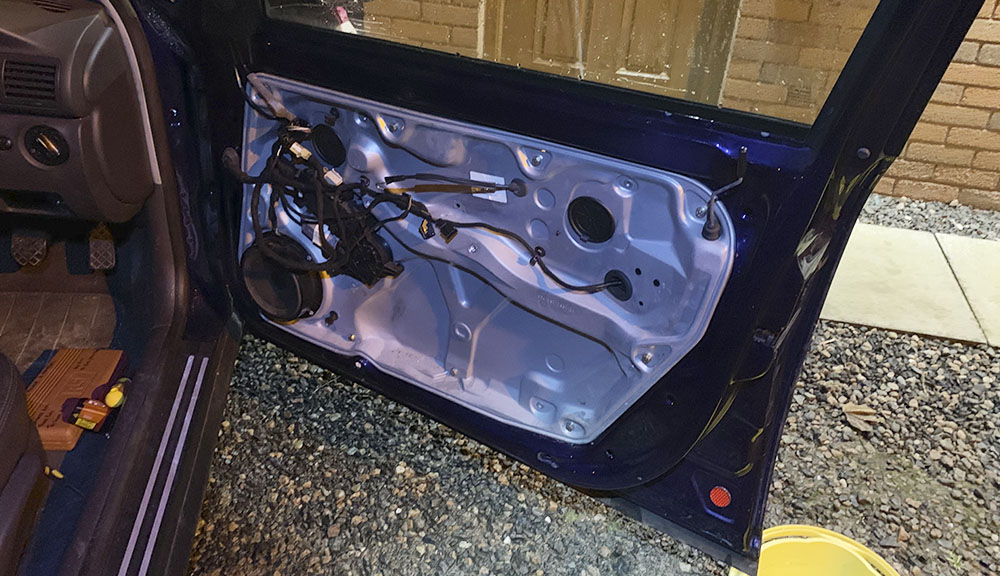
Re-sealing of driver-side doorskin with RTV Gasket Sealer
Airbag Crash Sensor
One of the most expensive failures you can have within this car. Located in the most moisture prone section of the car, the passengers footwell, overtime as moisture attacks the electronics, it will cause the airbag crash sensor to fail.
Although a simple replacement and resetting of the airbag light, the cost of this part will hit you hard, especially as you need it to pass your MOT.
Part Cost: £160
Coolant Temperature Sensor
This one will go eventually on the car and it results in the temperature gauge reading wrong, which will cause for the cars ECU to slightly over fuel as it thinks it needs to heat the engine up more. What’s most surprising is that this part costs £60, but it isn’t the most difficult part to replace.
Window Regulators
Overtime and with age, window regulators on cars do fail. These aren’t the worst to replace, but I opted to get someone else to do it for me. Do make use of genuine regulators as the cheap ones are just plain useless. So far we’ve had both front windows fail, with them starting to make the dreaded clicking and clacking noises.
CV Joints
Budget to have these replaced, based on your mileage of course, each year. On speaking with my mechanic, these are renowned for the CV boot splitting open and allowing for the grease to seep out. They aren’t the most expensive parts, but it can quickly add up.
Heat Exchanger
15 years is enough time to allow for your heat exchanger to corrode through and leak. This is a dreaded job as replacement requires the whole dash to come out of the car, making it approximately a 12hour job depending on how much faffing you end up doing whilst putting it back together. Cheap parts, expensive labour and was most definitely out of my skillset, requiring me to ask my mechanic to complete the repair
You’ll start to notice it failing whenever you smell coolant through the vents when the heating is on, a small area of condensation which doesn’t leave from the windscreen or, when its completely failed, steam coming from the dash, wet carpets and dropping coolant levels.
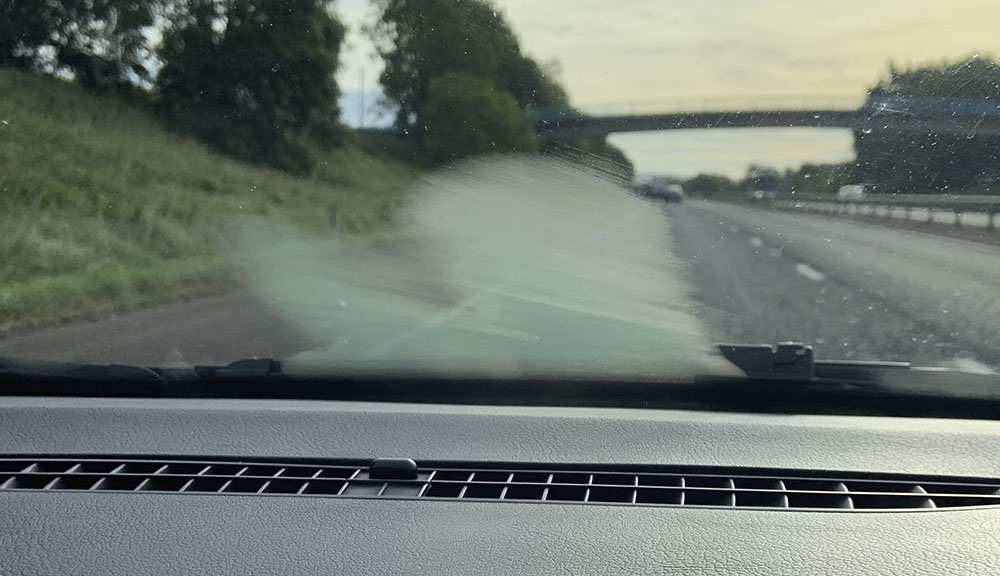
Moisture laden on windscreen due to failing heat exchanger
Other Repairs
Generally, the car is quiet good with other items of repair, although the list above is already quite large! Service every 8k miles, tires have lasted over 30k miles with a mid-rotation at 15k. A new timing belt and water pump was fitted at 132k miles with thermostat. Finally, a full set of new rear brakes were required after a calliper had seized up.
To Summarise
Although there is a lot that can go wrong with the car, I do have to continue to praise its great points. As with all Passats, the comfort of the driving experience is exceptional and matched with the 130BHP engine, enables the ability to easily overtake vehicles or tow trailers with ease.
Do I regret my purchase? To an extent. I always believe I should have waited a bit longer and found one of these in estate varient that was looked after a bit better - maybe then my ownership wouldn't have ended up being mostly repair work. But still, as noted above I really enjoy how the vehicle handles and performs under all scenarios.
I've included a table below for those whom have read this far, with included cost breakdown of all maintenance items completed on the car under my ownership.
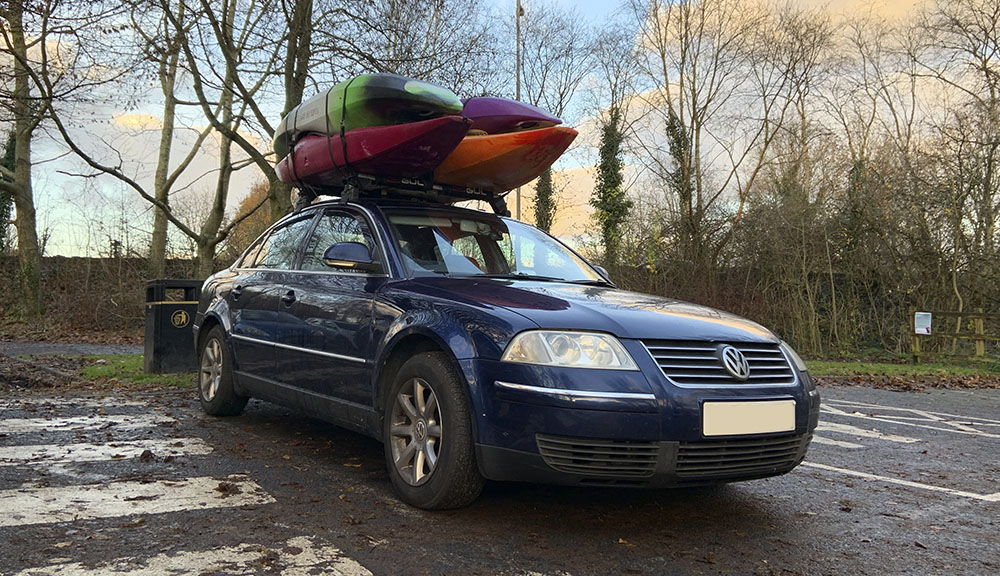
Kayak's laden on the roof at Shaw's Bridge